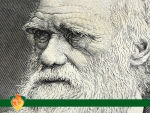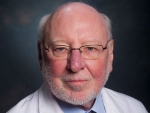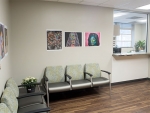Displaying items by tag: division of infectious diseases
UAB invites you to Darwin Day: A Celebration of Science, which highlights how AIDS and malaria became prevalent in Africa and created a worldwide epidemic.
Tagged under
Curated by art history students, the exhibition focuses on three epidemics, along with a lecture by Michael Saag, M.D.
Tagged under
A new oral antibiotic medication has been determined to be successful in the treatment of uncomplicated urogenital gonorrhea.
Tagged under
A new study conducted in part at UAB could change the way doctors treat a common sexually transmitted disease.
Tagged under
Cohort study shows that patients with a condition known as candidemia were 66 percent less likely to die with proper consult.
Tagged under
The director of UAB’s Division of Infectious Diseases has been named to the board of a national health organization.
Tagged under
A UAB Distinguished Professor has been awarded a lifetime achievement award in the field of infectious diseases.
Tagged under
UAB’s Division of Infectious Diseases is growing its research facilities to offer more to the local and global sexual health community.
Tagged under
An increased association with STI in a vaginitis screening population has been found by a UAB researcher.
Tagged under
Experts have updated recommendations for the use of antiretroviral drugs in the treatment and prevention of HIV infection.
The Alabama Vaccine Research Clinic will be testing the efficacy of a vaccine that could help combat a rare strain of avian influenza.
A published UAB perspective suggests interventions that could help avoid sexual transmission of HIV without condoms.
Tagged under
With Birmingham-area hospital emergency medicine resources stretched to capacity, physicians urge those with flu symptoms to call primary care providers or utilize UAB eMedicine.
Local organizations fighting to end the spread of AIDS by 2030 will be a focal point at UAB’s World AIDS Day celebration.
Protecting vulnerable populations from contracting influenza is a priority among UAB and local organizations.
A collaboration between Birmingham AIDS Outreach and the UAB 1917 Clinic looks to provide nutrition support and education to address and prevent the rise of chronic disease in patients living with HIV.
Tagged under
Infectious diseases professor at UAB will collaborate with researchers, policy experts and clinicians from across the country to provide nonpartisan, evidence-based guidance.
Tagged under



















